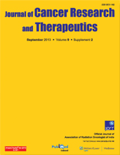
Journal of Cancer Research and Therapeutics
Scope & Guideline
Elevating the dialogue in oncology and radiology.
Introduction
Aims and Scopes
- Clinical Trials and Therapeutics:
The journal emphasizes the reporting of clinical trials and therapeutic interventions across various cancer types, providing insights into efficacy, safety, and patient outcomes. - Molecular and Cellular Biology of Cancer:
Research on the molecular mechanisms underlying cancer development and progression is a core focus, including studies on genetic mutations, signaling pathways, and tumor microenvironment interactions. - Radiotherapy and Interventional Techniques:
The journal includes research on advancements in radiotherapy techniques, such as intensity-modulated radiation therapy (IMRT) and brachytherapy, as well as interventional approaches like ablation and chemoembolization. - Cancer Epidemiology and Prevention:
Epidemiological studies exploring risk factors, prevention strategies, and population-based cancer trends are highlighted to inform public health initiatives. - Innovative Diagnostic Approaches:
The journal covers novel diagnostic techniques, including imaging advancements and biomarker discovery, that aid in the early detection and accurate characterization of tumors. - Patient Care and Quality of Life:
Research addressing the psychosocial aspects of cancer care, including quality of life assessments and supportive care strategies, is integral to the journal's scope.
Trending and Emerging
- Immunotherapy and Personalized Medicine:
There is a growing emphasis on research related to immunotherapy approaches and personalized treatment plans tailored to individual genetic profiles, reflecting a paradigm shift in cancer treatment. - Molecular Targeted Therapy:
Studies focusing on targeted therapies that inhibit specific molecular pathways are increasingly prominent, showcasing advancements in drug development and efficacy. - Artificial Intelligence and Machine Learning in Oncology:
The integration of AI and machine learning techniques in cancer diagnosis, treatment planning, and outcome prediction is a rapidly emerging area, enhancing the precision of oncology practices. - Cancer Genomics and Biomarkers:
Research into cancer genomics, including the identification of biomarkers for early detection and therapeutic response, is on the rise, facilitating advancements in precision oncology. - Quality of Life and Patient-Centered Care:
There is an increasing focus on research that evaluates the quality of life for cancer patients, addressing the psychosocial aspects of treatment and survivorship. - Novel Therapeutic Delivery Systems:
Emerging studies on innovative drug delivery systems, such as nanoparticles and nanocarriers, are gaining traction as they promise to enhance the efficacy of cancer therapies.
Declining or Waning
- Traditional Chemotherapy Studies:
Research specifically focused on traditional chemotherapy regimens has waned, possibly due to the increasing interest in targeted therapies and immunotherapies that offer improved outcomes. - Single-Agent Studies:
There has been a noticeable decrease in studies evaluating the efficacy of single-agent therapies, as the trend shifts towards combination therapies that leverage synergistic effects. - Basic Science Research on Common Cancer Types:
Basic research on well-characterized cancer types (e.g., breast, lung) has reduced, as researchers increasingly explore rarer malignancies or investigate complex interactions in tumor biology. - Conventional Imaging Techniques:
The reliance on conventional imaging modalities for cancer diagnosis is declining, as advanced techniques such as molecular imaging and radiomics gain prominence. - Palliative Care Research:
While still important, the volume of research specifically focused on palliative care strategies has decreased, possibly overshadowed by curative treatment advancements.
Similar Journals
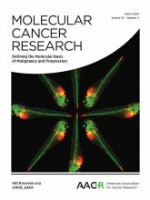
MOLECULAR CANCER RESEARCH
Connecting Researchers to the Future of Cancer CareMOLECULAR CANCER RESEARCH, published by the American Association for Cancer Research, stands as a pivotal journal in the fields of cancer research, molecular biology, and oncology. With an impressive impact factor and recognized as a Q1 journal in its respective categories for 2023, it serves as an essential resource for researchers, professionals, and students aimed at advancing our understanding of cancer mechanisms and therapies. The journal, identified by the ISSN 1541-7786 and E-ISSN 1557-3125, provides a platform for cutting-edge research and clinical applications, emphasizing innovation and collaboration within the scientific community. With its focus on high-quality, peer-reviewed articles, MOLECULAR CANCER RESEARCH is vital for anyone looking to stay abreast of significant advancements in cancer biology and treatment strategies. For more details and to access the journal's content, please visit the publisher's link.

CANCER GENE THERAPY
Innovating Genetic Solutions for OncologyCancer Gene Therapy, published by SpringerNature, stands at the forefront of research in the fields of cancer research, molecular biology, and molecular medicine. With a robust impact factor reflecting its significant influence—ranking in the Q2 category for cancer research and Q1 for both molecular biology and molecular medicine—it serves as an essential resource for scholars and practitioners alike. Since its inception in 1994, the journal has dedicated itself to advancing the understanding and therapeutic application of genetic innovations in oncology. Notably, it holds distinguished Scopus ranks, placing it among the top tier journals in its categories, underscoring its importance to the scientific community. While open access options are not available, the compelling research published here offers invaluable insights into the latest advancements and strategies in cancer therapy. Engaging with *Cancer Gene Therapy* not only keeps professionals informed but also inspires future innovations in the quest for effective cancer treatments.
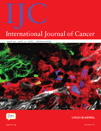
INTERNATIONAL JOURNAL OF CANCER
Exploring the frontiers of cancer science and treatment.INTERNATIONAL JOURNAL OF CANCER, published by Wiley, stands as a premier platform for the dissemination of cutting-edge research in the fields of cancer research and oncology. With an impressive impact factor reflecting its rigorous peer-review process and significant contribution to the scientific community, this journal is categorized in Q1 for both Cancer Research and Oncology as of 2023. It boasts notable rankings, being placed 38th among 404 journals in Medicine - Oncology and 32nd among 230 in Biochemistry, Genetics, and Molecular Biology - Cancer Research, positioning it within the 90th and 86th percentiles, respectively. Since its inception in 1966 and continuing to 2024, the journal has played a pivotal role in advancing our understanding of cancer biology, treatment modalities, and innovative therapeutic approaches. While it operates under a subscription model, the journal is committed to making valuable research accessible to a broader scientific audience. Researchers, professionals, and students alike will find the INTERNATIONAL JOURNAL OF CANCER an essential resource for staying abreast of the latest advancements in cancer science.
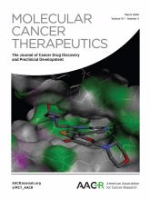
MOLECULAR CANCER THERAPEUTICS
Connecting science and healing in the fight against cancer.MOLECULAR CANCER THERAPEUTICS, published by the American Association for Cancer Research, is a premier journal dedicated to advancing the field of cancer research and therapy since 2001. With a notable impact factor reflecting its high-quality content, this journal stands out in the Q1 category for both Cancer Research and Oncology as of 2023. Researchers, clinicians, and students interested in innovative treatment strategies and molecular mechanisms can find valuable insights within its pages, bolstered by a rigorous peer-review process and a global perspective on cancer therapeutic developments. Although the journal operates under a subscription model, it provides comprehensive access to cutting-edge studies and reviews that drive forward the understanding of cancer biology and treatment modalities. The journal's impressive Scopus rankings further validate its influence within both oncology and the broader cancer research community, making it an indispensable resource for anyone committed to combating cancer through science.

Translational Cancer Research
Exploring the latest breakthroughs in cancer research.Translational Cancer Research, published by AME Publishing Company in Hong Kong, is a pivotal journal aimed at fostering the advancement of oncology-related knowledge through the dissemination of high-quality research findings. With its ISSN 2218-676X and E-ISSN 2219-6803, this journal serves as a vital resource for researchers, professionals, and students in the fields of Cancer Research, Oncology, and Radiology, Nuclear Medicine, and Imaging. Established in 2012, the journal covers the latest breakthroughs and cross-disciplinary approaches that drive innovation in cancer treatment and diagnostics. Although currently classified in the Q4 Quartile for Cancer Research and Q3 for both Oncology and Radiology, Translational Cancer Research continuously works toward improving its academic influence and impact, evidenced by its ongoing research contributions. The journal emphasizes open access, making crucial research available to a global audience. We invite scholars and industry professionals to engage with the latest findings and discussions within these critical areas of medical science.

Frontiers in Oncology
Empowering breakthroughs in cancer treatment and care.Frontiers in Oncology is a premier open access journal dedicated to advancing the field of oncology through innovative research and knowledge dissemination. Published by FRONTIERS MEDIA SA since 2011, this journal is based in Switzerland and holds an impressive Q2 ranking in both Cancer Research and Oncology as of 2023, highlighting its significance in the academic community. With its commitment to open access, Frontiers in Oncology ensures that vital research is readily available to researchers, healthcare professionals, and students around the globe, enhancing collaboration and fostering breakthroughs in cancer research. The journal's robust Scopus rankings further illustrate its academic influence, with notable positions in the fields of Oncology and Cancer Research. By covering a wide range of topics within oncology, this journal serves as a vital resource, supporting the rapid evolution of cancer treatment, diagnostics, and patient care strategies.

Cancer Reports
Fostering collaboration in the fight against cancer.Cancer Reports, published by WILEY, is an esteemed open-access journal dedicated to the field of oncology and cancer research. With a focus on disseminating impactful research findings since its transition to fully open access in 2021, Cancer Reports aims to facilitate knowledge sharing among researchers, clinicians, and healthcare professionals globally. The journal is positioned within the Q3 quartile for both Cancer Research and Oncology categories as of 2023, reflecting its commitment to quality and relevance in a competitive publishing landscape. With an ISSN of N/A and an E-ISSN of 2573-8348, the journal showcases studies across diverse aspects of cancer biology, treatment modalities, and patient care strategies. Located in the United Kingdom at 111 River St, Hoboken 07030-5774, NJ, Cancer Reports strives to contribute to the advancement of cancer research and improve health outcomes for patients worldwide, making it a pivotal platform for scholars and practitioners in the oncology community.
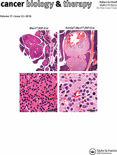
CANCER BIOLOGY & THERAPY
Pioneering discoveries in the battle against cancer.CANCER BIOLOGY & THERAPY is a premier open-access journal published by Taylor & Francis Inc, dedicated to advancing the field of cancer research and treatment. Since its inception in 2002, the journal has evolved to provide a platform for innovative research and groundbreaking findings, addressing critical aspects of cancer biology, pharmacology, and molecular medicine. With an impressive impact factor and recognition as a Q2 journal in vital categories such as Cancer Research, Oncology, and Pharmacology, it holds significant standing in Scopus rankings, reflecting its influence and commitment to disseminating high-quality research. Offering researchers, professionals, and students a wealth of knowledge, CANCER BIOLOGY & THERAPY stands at the forefront of the fight against cancer, presenting the latest developments and therapeutic strategies vital for improving patient outcomes. Accessible to all since 2022, this journal is a must-read for anyone involved in the multifaceted arena of cancer research and treatment.
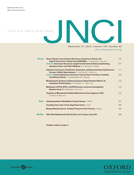
JNCI-Journal of the National Cancer Institute
Unveiling the complexities of cancer for better outcomes.JNCI-Journal of the National Cancer Institute, published by Oxford University Press Inc. in the United Kingdom, is a premier journal dedicated to advancing the field of cancer research and oncology. With a distinguished history dating back to 1940, this journal has consistently maintained a strong reputation within the academic community, achieving a remarkable Q1 ranking in both Cancer Research and Oncology as of 2023. Researchers and practitioners rely on the JNCI for original research articles, review papers, and cutting-edge findings that impact clinical practices and therapeutic strategies. Although it does not currently offer open access, the journal remains a vital resource for academicians and healthcare professionals seeking to enhance their understanding of cancer mechanisms and treatment innovations. Its rigorous peer-review process ensures the publication of high-quality, credible research that meets the evolving challenges of cancer treatment and prevention through to 2024.
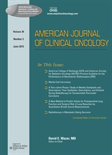
AMERICAN JOURNAL OF CLINICAL ONCOLOGY-CANCER CLINICAL TRIALS
Transforming Cancer Treatment with Cutting-Edge ResearchAMERICAN JOURNAL OF CLINICAL ONCOLOGY-CANCER CLINICAL TRIALS, published by Lippincott Williams & Wilkins, is a pivotal journal in the fields of oncology and cancer research, focusing on the latest advancements in clinical trials and therapeutic strategies for cancer management. With an ISSN of 0277-3732 and an E-ISSN of 1537-453X, this journal serves as an essential resource for the dissemination of high-quality research findings, scholarly reviews, and innovative methodologies, aiming to advance clinical oncology from 1982 to 2024. It is categorized in Q3 for Cancer Research and Q2 for Oncology, reflecting its significant role in the scientific community. In addition to its rigorous peer-reviewed content, the journal provides a platform for researchers and clinicians to share valuable insights, laying the groundwork for future breakthroughs in cancer treatment. Although it currently does not offer open-access options, the journal remains accessible to a wide audience through academic institutions and libraries. The AMERICAN JOURNAL OF CLINICAL ONCOLOGY is crucial for anyone involved in oncology research, making it a must-read for professionals dedicated to improving cancer care.